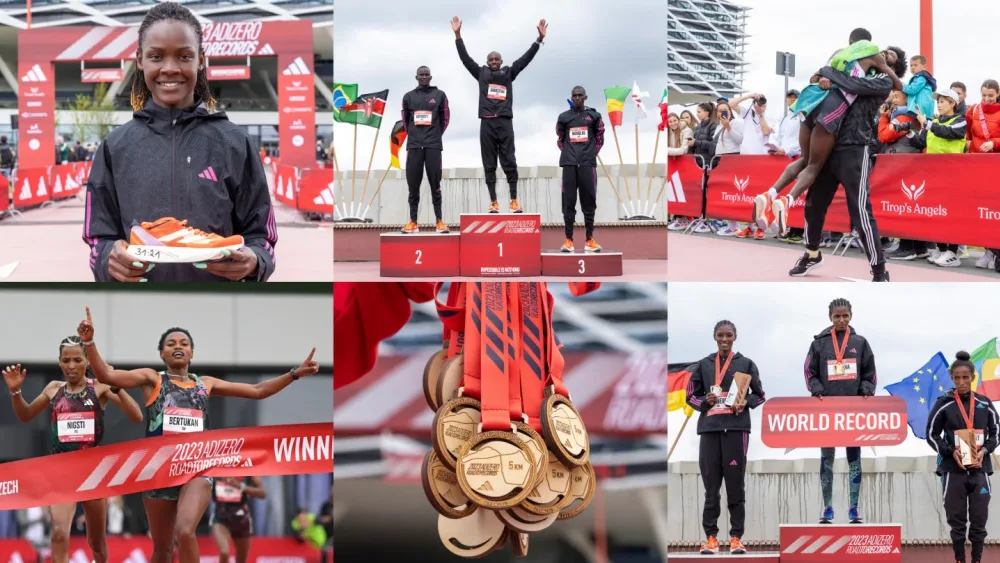
Portia Woodman’s Unique Perspective on Team Play and Togetherness
With positive team culture and a sense of belongingness being integral parts to her Black Ferns sisterhood. Portia Woodman sat down with me to discuss how she draws upon her Māori roots, a splash of healthy competition, and a whole lot of hard work to get the Black Ferns in their top form.

As I see Portia Woodman approaching me, I’m conflicted. She’s got the build of an athlete who is gifted with not only speed, but the broad shoulders to take down anyone in her path if she so wishes. But the first thing that greets me is her smile. This is followed by an outstretched hand. Looks like I’m in the clear. Finally, she opens her mouth… and nothing comes out.
Her voice has lost its reception. The Black Ferns Sevens team is visiting our HQ in Herzogenaurach, Germany just under 24 hours after winning the World Rugby Sevens World Series in Toulouse, France. She apologizes that her voice didn’t make the trip with her after their victories. It’s quite the paradox though. I’ve never met anyone before who is so hoarse and who comes across so clearly at the same time.
Once we get seated, I inch my seat closer to Portia to let her recharge the batteries of her vocal cords, but she’s not having any of it. She swoops up and sits in the chair next to me. She leans forward and places her elbows on her knees and listens attentively. Adjusting to her surroundings is part of her nature; and in terms of her rugby development, it’s something she’s done ever since she received the life-changing news at a Burger King. Yes, that Burger King.
This 31-year-old is the first woman to cross the 200 tries threshold on the World Sevens circuit in rugby. Her background is Māori (pronounced ‘Mau-Ree’, which I pick up on during our talk), and bits of the Te Reo Māori language—which is one of the three official languages of New Zealand—crop up when she talks about the rugby sisterhood.
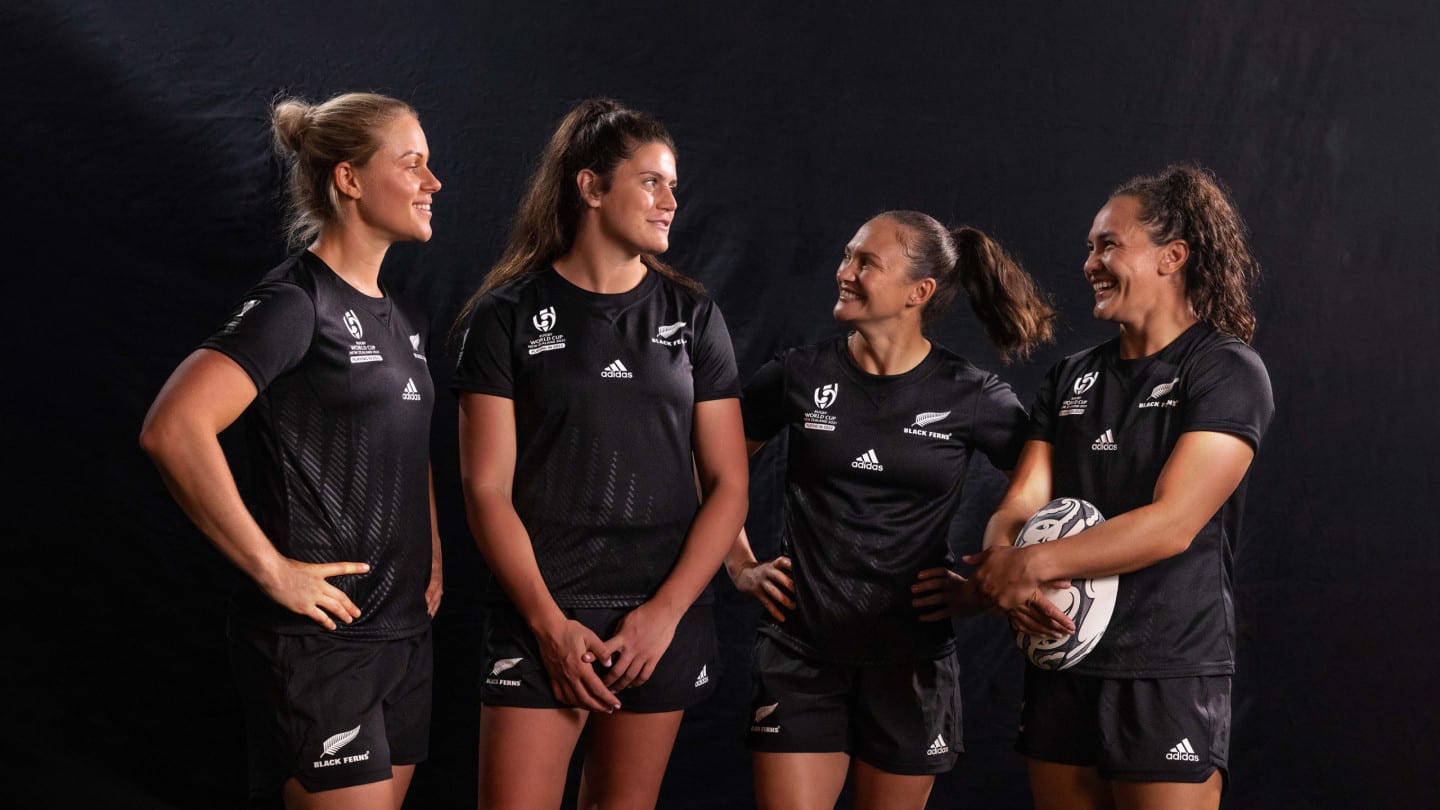 The Black Ferns sisterhood is an integral part to their winning ways.The sisterhood of the traveling sevens and 15s.
The Black Ferns sisterhood is an integral part to their winning ways.The sisterhood of the traveling sevens and 15s.
The number denotes how many players are on a side during a match. And as you can imagine, the rugby format with lesser players is more intimate and requires almost twice the amount of hustle, while the 15s has more specialized roles on the pitch. The similarities lie in the communication and chemistry required amongst the team to come out victorious; and that’s where the sisterhood is the secret hot sauce which enables a team like the Black Ferns Sevens to inflict punishment on their opponents. But a free flowing, positive and upbeat team chemistry isn’t something that comes overnight—you have to work at it. And if Portia’s experience meeting the team for the first time was anything like my college onboarding weekend, it would take some time to adapt, make friends and get over any homesickness—but Woodman is a different breed.
She recalls meeting the team for the first time back in 2012 and finding that sense of belonging with her new Black Ferns Sevens family.
"As cliché as it is, I don’t know. But like, it felt like a sisterhood. Like, I don’t have any sisters, but I felt like I have [a] whole team of sisters now."
She attributes much of her success in extending her family tree to include a few ferns on its branches, instantaneously, upon arrival in the Black Fern’s clubhouse to her then coach, Alan Bunting. His pep talk for the incoming women class of rugby athletes was simple: be your unique self and bring out the personality that you have when you’re at home.
In terms of headspace, many of these women found themselves in a similar waka—that’s Māori for canoe—and were coming together for the first time as a national rugby team. The Black Ferns Sevens only came into existence in 2012. In Portia’s case, she wasn’t exactly alone when she arrived. She already knew a familiar face who would also be wearing the Black Ferns Sevens signature black jersey, that carries the silver fern insignia which sits just below the collarbone and opposite our three stripes logo; and that bring us back to her Burger King Hawaiian (she describes it as a chicken burger) chow down sesh when she received a call from the Black Ferns management.
Portia and her hometown rugby playing mate, Kayla McAlister, were at a Burger King drive-through when Portia’s phone rang. Upon getting off the phone, she turned to Kayla, who was also putting away her phone.
"We both looked at each other like, ‘Did you just get a call?’ And she was like, ‘Yeah, did you just get a call?"
The two just got word that they were selected after trying out for the Black Ferns earlier in the year. They would then be Fiji bound for a qualifying tournament where they would first meet the rest of the Black Ferns. This game changing news was the result of a Facebook ad that called for rugby athletes to try out for the national team as part of the Go For Gold program—a chance to go the 2016 Olympics in Rio.
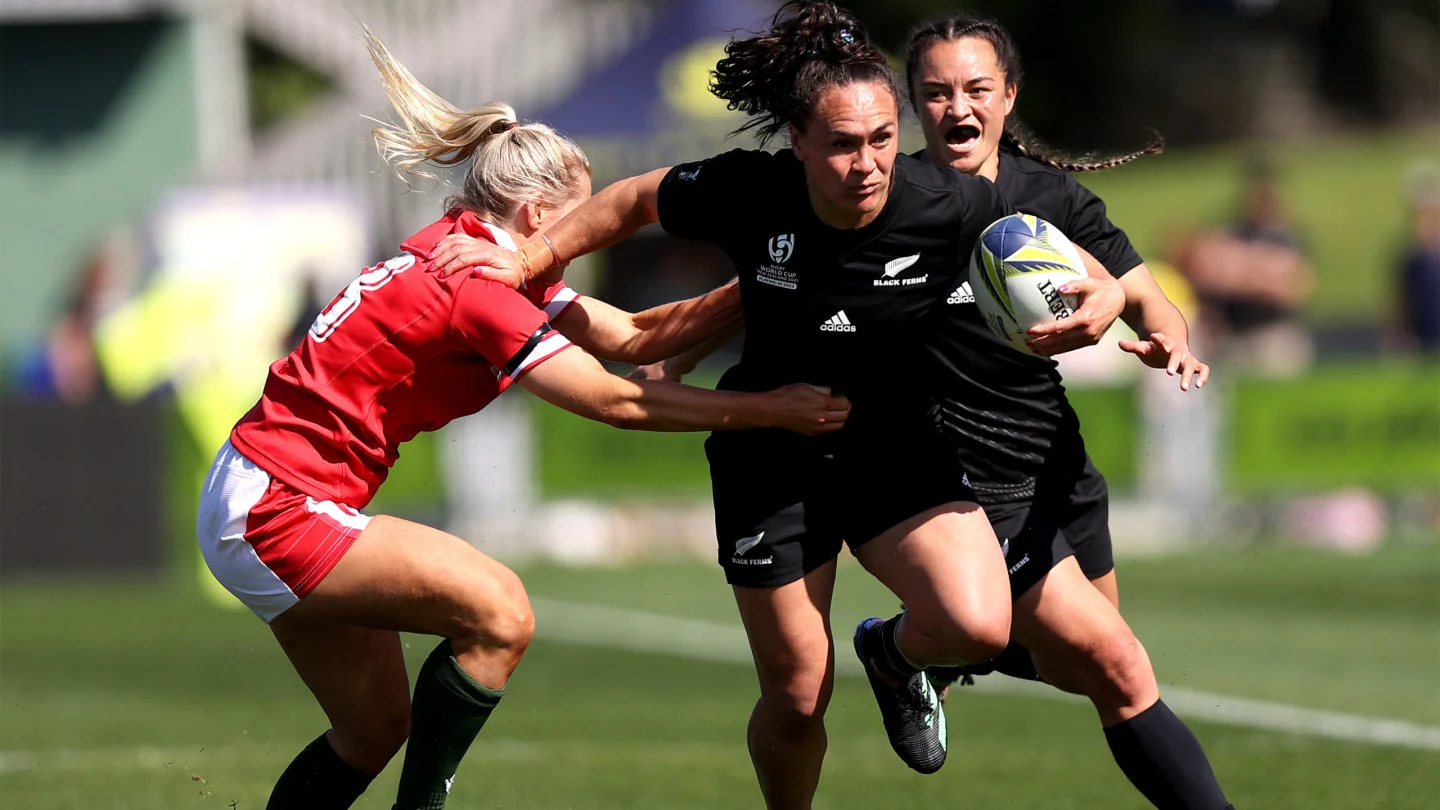 Leading by example is how Portia shows up for her team and her rugby sisters. ©Phil Walter/Getty Images
Leading by example is how Portia shows up for her team and her rugby sisters. ©Phil Walter/Getty Images
The Black Fern Seven’s positive on-field culture: the origin story.
When a group of strangers comes together for the first time—be it a rock band, a pick-up game of rugby, or even a school group project—establishing a creative, productive, and fun culture amongst everyone is no easy feat. But after some small talk, a few icebreakers, and establishing the first semblance of friendship bonds, you can usually tell who is the person that the other group members look to when a question or task pops up to set the tone; and that’s also an indicator of who do a majority of the group trust and respect. And here’s where natural born leaders come into the picture. Not necessarily the most outspoken individuals, but the ones who are empathetic, understanding, and willing to go the extra mile.
Portia is rather softspoken (admittedly because of her momentary laryngitis), but having spoken to her about her lengthy career, her accomplishments (winning trophies, breaking records, and being a role model to women across the globe), as well as her knack for simultaneously juggling leading a team while still learning about the game itself makes her an exemplary person you want in your clubhouse or locker room. She radiates positivity and a can do, happy go lucky mindset.
“In terms of my maturity level of leadership, I was still trying to figure out the game,” she says. After honing her skills on the rugby pitch, her leadership style would continue to blossom into someone who shows with her actions—and not just with her words—what’s expected of others.
"I didn’t talk much as a leader when I first started, not that I really talk now either. But in the early stages, I was a real quiet leader. I guess I would say that I’m a leader by example."
She delves deeper into her leadership style: “It’s about encouraging [the women]. It’s doing absolutely everything you possibly can to make you a better person for the team.” In her eyes, this means anything from carrying bags to and from the bus, picking up the bibs, balls, and cones, to showing your teammates a dance and then having everyone do it for a recorded TikTok video. It’s an “everyone chips in, get the job done kind of thing,” as Portia says, which could mean that everyone gives it their all for a thrash (slang for brutal training) or shows up for their teammates for a song and a dance.
A positive culture with a competitive edge.
Eleven years into her career, Portia is just as competitive as ever. She doesn’t mean it in a harsh way. It’s quite the opposite. She wants to beat you so that she can beat herself and become a better player. Take Stacey Waaka as an example, who also made the trip to Herzo. Portia is quick to acknowledge that she’s the best there is—and she loves that.
Within our whole team, we have this amazing competitive drive. It’s not like toxic or anything like that because I can appreciate Stacey is an amazing player right now. But I’m going to be like, I’m going to do everything I can to beat you [Stacey],” says Portia, referring to the work she’s going to put in during the team’s layover until competition starts up again in November.
"Within our whole team, we have this amazing competitive drive."
The closest I can compare Portia’s competitive spirit with is a sibling rivalry. As a kid, I remember staring off into the distance and pointing to a trashcan 500 meters out. My older brother would then lock eyes with the same trashcan, and it was only a matter of seconds before we both started a telepathic countdown in our minds. After he would beat me by a fraction of a second (or more like a fraction of a minute), he’d take me out for an ice cream, and we’d be in the thick of fun—and I dare say I’m a little nimbler from our high noon ‘run offs.’
And speaking of family, Portia, is quick to dial down her competitiveness when we talk about her daughter, Kaia. Portia and her partner, Renee Wickliffe, both share a child. The 10-year-old daughter entered the scene via Renee from a previous relationship. As it turns out, the sporty daughter isn’t exactly the most competitive.
When you ask about the daughter’s level of competitiveness—or lack thereof—her eyes widen in disbelief, backed with a wry smile. “Yea, I have to bite my tongue. But just, yeah, well, I have to remember that she’s literally just experiencing it [sports].” Says Portia. The couple have gotten her involved in gymnastics and she loves doing flips. When she was encouraged to participate in competitions at the young age of five, Portia didn’t see the need to introduce that element of sport into the child’s life so early on. Instead, Portia is just “happy for her just to come in, have fun, you know, swing on the bars and have some really cool experiences in gymnastics.” One thing Portia revels in is the daughter’s openness to try new things. “She signed up for basketball this year and I was like, ‘that’s so random,’ but I love it.”
It’s easy to see Portia as an empathetic and sensitive chameleon for her teammates, friends, and family.
Exhibit A: I’ve been talking to her for over an hour as she struggles to make a sound, and she’s game to probably go another hour.
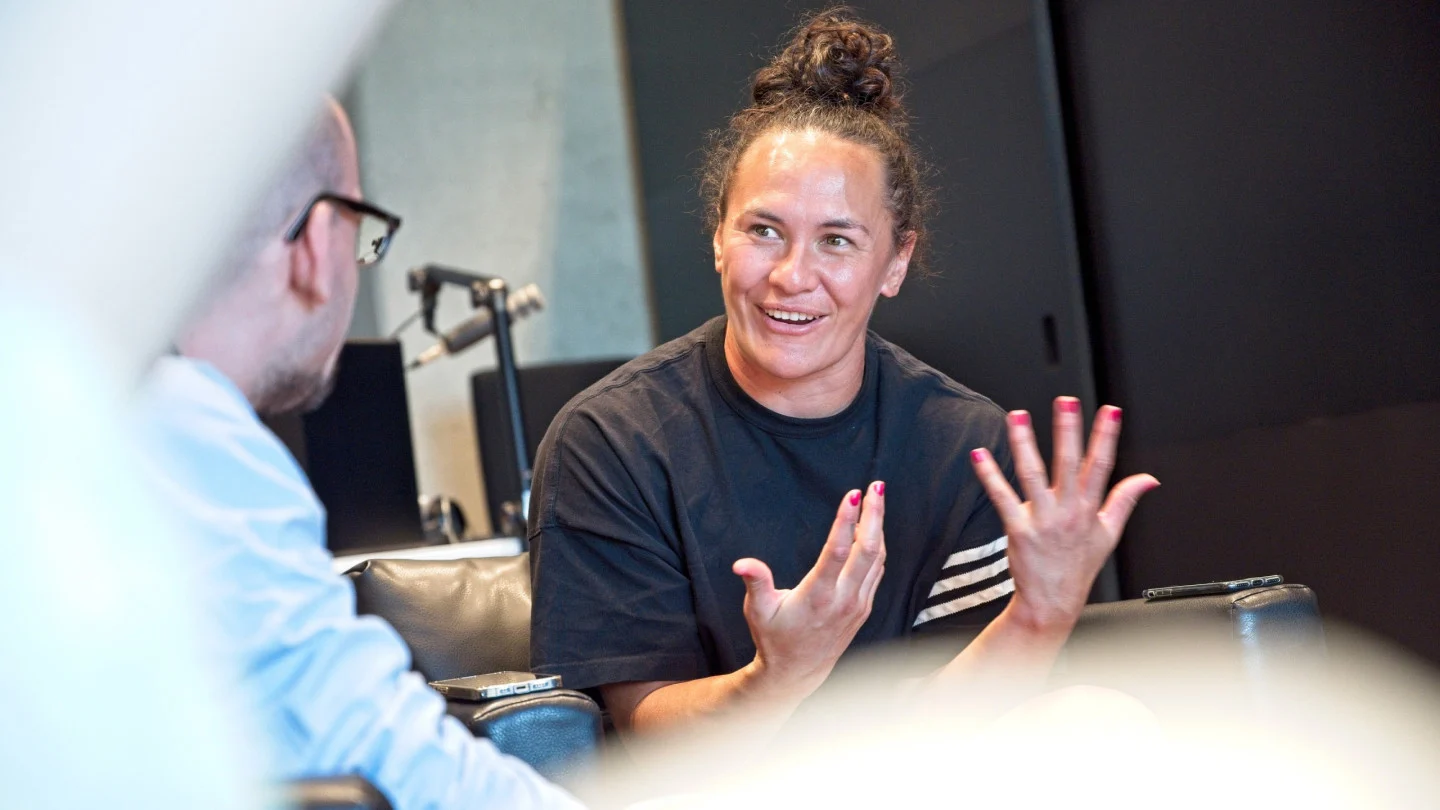 Portia’s empathy extends from her team all the way to her family and friends.
Portia’s empathy extends from her team all the way to her family and friends.
Sensitivity in the clubhouse goes a long way in building a positive culture.
For young women in their late teens who have relocated from all different regions of New Zealand to train with the Black Ferns, it’s not all peachy scrums. Portia reflects on some of the hardships that hold true for all professional sports. Like after putting in hours of effort, only to come up short and not make the starting roster. She says, “[the] mental struggle of not being selected, not playing. You’ve just made the New Zealand squad, but you’re not actually playing for New Zealand yet. So yeah, that part’s hard.” And she recognizes that it’s part of the team’s responsibility to keep tabs on teammates who might feel down and need a tailored based talking to depending on the sister.
She says, “We’ve got a bunch of leaders who connect with different people in different ways. So like, for me, I’m more of a quiet person. I’ll probably go up to a young kid if they’re struggling—just allow them to talk and take them out for a coffee or a lunch or whatever and just allow them to talk. Spill the beans on what’s troubling them.”
"We’ve got a bunch of leaders who connect with different people in different ways."
The Ferns are comprised of three cultures: New Zealanders (who Portia refers to as “Kiwis”), Samoans, and Māori. Each culture is unique, but there’s a bridge everyone who puts on a Black Fern jersey needs to cross where they’ll chant at the top of their lungs, slap their thighs in sync, and challenge their opponents. This is the haka. It’s indigenous to the Māori people to celebrate their heritage and has captured the hearts of YouTube spectators who find themselves trying to imitate its moves. It’s also why Portia’s voice box is almost on mute.
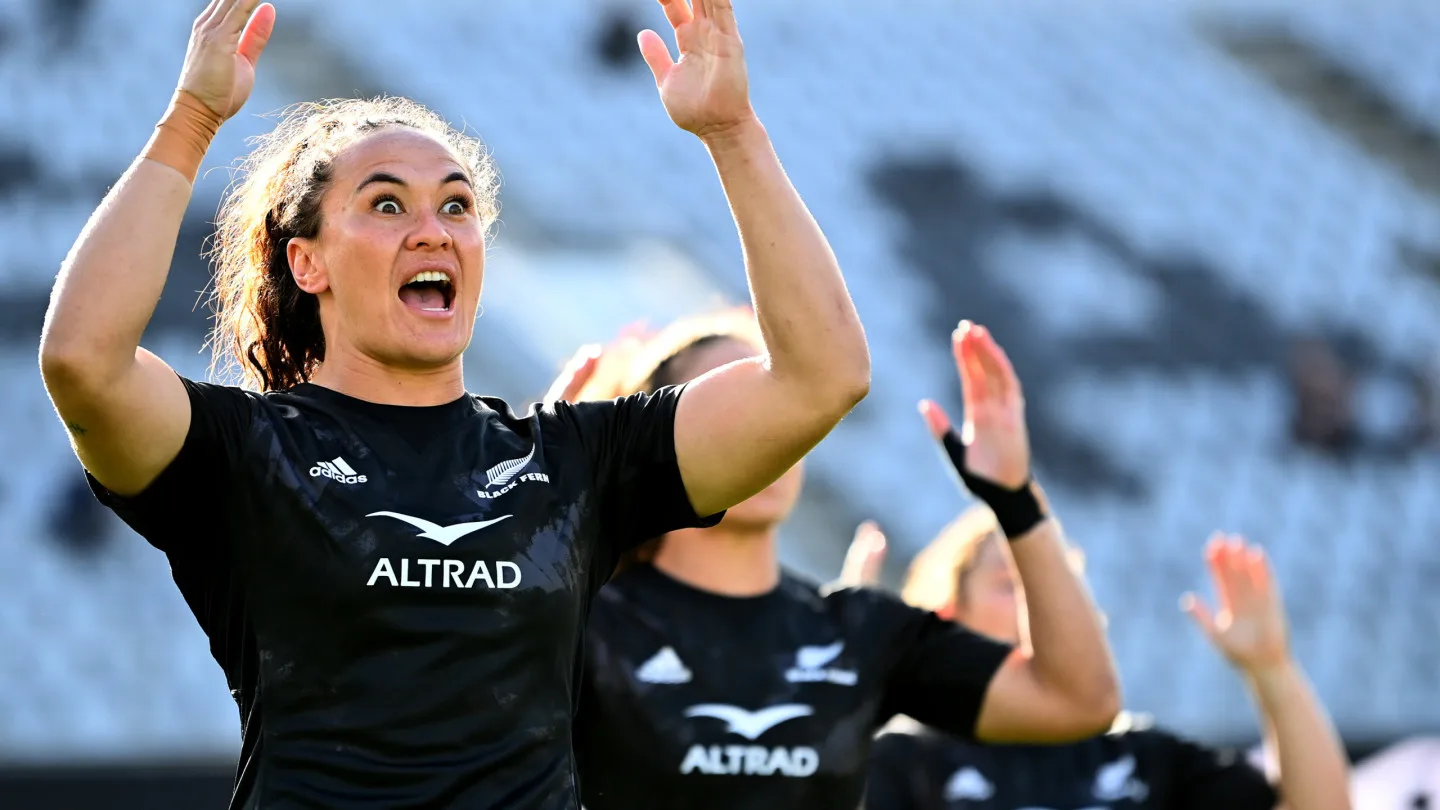 Learning the Haka is a right of passage for the Black Ferns. ©Hannah Peters/Getty Images
Learning the Haka is a right of passage for the Black Ferns. ©Hannah Peters/Getty Images
Even the quieter teammates make some noise for the Haka.
For the Māori, the haka is an opportunity to align on an environmental and spiritual level – to pay tribute to those who have passed on. From an outsider’s perspective, the dance gives off the impression that it’s meant to challenge opponents before a match, which it also sets out to do. Everyone follows the choreography as one unit and chants in the Māori tongue. For the Kiwis and Samoans, who are generally more reserved and low-key, according to Portia, there’s a learning curve for the dance. But she takes the time, along with teammate Stacy Waaka, to have one-on-one coaching sessions until all the women feel comfortable connecting with Haka lore at a louder decibel.
She continues, “It takes a while to get to this point [where they feel comfortable doing the haka], but they [referring to her teammates] are amazing.”
"We just try, I guess, to pick what the haka means. If they can get a really good understanding of what the haka means, then they can express the emotion that is relative to that haka."
And the take home for any incoming Black Ferns is that they use the haka as a vessel to express however they feel at a given moment.
The Black Fern Sevens track record is a proof point that it’s worth it to take the time to instill a sense of comfort, belonging, and positive culture within a team. The Black Ferns Sevens won silver at the 2018 Rio summer Olympics and cashed in with gold in Tokyo at the 2020 games. The team has also amassed five World series titles; and they’re currently the World Champions after winning the title in 2013 and yet again in 2018.
And sometimes getting to that place of comfort where the wins start rolling in involves some of the women going out of their comfort zone—take for example, performing in front of a crowd of over 40,000. But Portia suggests that comfort comes from a place of respect and is crucial to establishing a positive team culture.
She talks of what respect means to her: “You know, for us, it’s all about respect; and we try to live by [it] in Māori terms. For Māori, there’s this word mana, and mana is the feeling people get when you leave the room.”
"mana is the feeling people get when you leave the room"
She goes on about what she looks for as outcomes in her interactions, by saying, “When you leave [with that] feeling of, oh, that’s a really cool person, or I like the way they behaved, or I like the way they respected me.” And her level of respect enables her to provide feedback to her teammates so that a positive culture has a fair chance to thrive and flourish.
Openness and authenticity are two more spices that are important to Portia’s positive culture potluck.
As a self-professed “quiet one” that is conflict avoidant, it’s not super easy for her to provide feedback. Yet, by always coming from a respectful place, she’s found her “gentle” style for addressing teammates who might not be aware of a particular habit that’s stunting the team’s collective rhythm. When it comes to confronting a teammate to improve their on-field chemistry, she says, “I’m at the stage, I’m not here to gossip and talk about people. So, I want to go and tell people [what’s wrong].” She wants the team to be the best there is. If something isn’t helping, she forces herself to tell teammates to “cut it out.” And without any drama, that leaves plenty of room for Portia and her sisters to have fun on and off the field.
And trust me, she doesn’t hold back on the “fun-ness” factor with the team. Describing her supporting cast of Black Ferns Sevens, Portia will go as far to say that “[the women] they’re a crack up, they’re hilarious, they’re straight up. They tell it to you straight if you’re not doing something not quite right. So, they’re a good time, but they also know how to work hard. And man, the trainings were brutal back in the day. And that’s what I think I kind of loved is that you saw your mates dying next to you on the field and you just wanted to do that for them as well.”
As our conversation winds down and I’m about to leave Portia’s voice off the hook for a momentary silent retreat, she connects the symbolism of what Māori culture stands for with the Black Ferns Sevens sense of teamwork—which could apply to any family or group of people bound together to perform a task.
"You know, they [the Māori people] take in the idea [that] everything works in harmony: the trees, the water, the mountains, all living things."
She transfers that mentality into the Black Ferns’ Sevens culture and summarizes, “We’ve got to work together to help each other thrive and survive. And if one thing breaks down, say if communication doesn’t work, if we’re not communicating properly, then the whole thing will crumble.”
The team will regroup for more training sessions after a six-week break to prepare for their next tournament in November. It was only 24 hours ago before sitting down with me that Portia and her Black Fern Sevens came back from a 14-point deficit to beat the United States 19-14 to lay claim to their sixth consecutive world rugby sevens tournament win. The Black Ferns have already qualified for the 2024 Paris Olympics and will attempt to defend their title. And after my talk with Portia, I don’t see any end in sight for the Black Ferns Sevens’ winning ways.
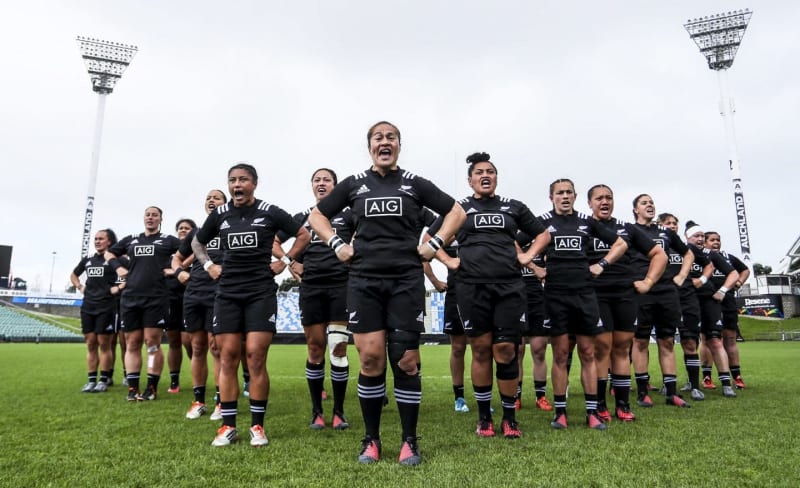
DISCOVER THE PURPOSE THAT DRIVES THE BLACK FERNS
They share their mission to keep girls in sport





